Cold Chain Logistics: Management Challenges & Solutions
The supply chain is a term used to describe all the components required to transport goods from beginning to end, from production to the end...
12 min read
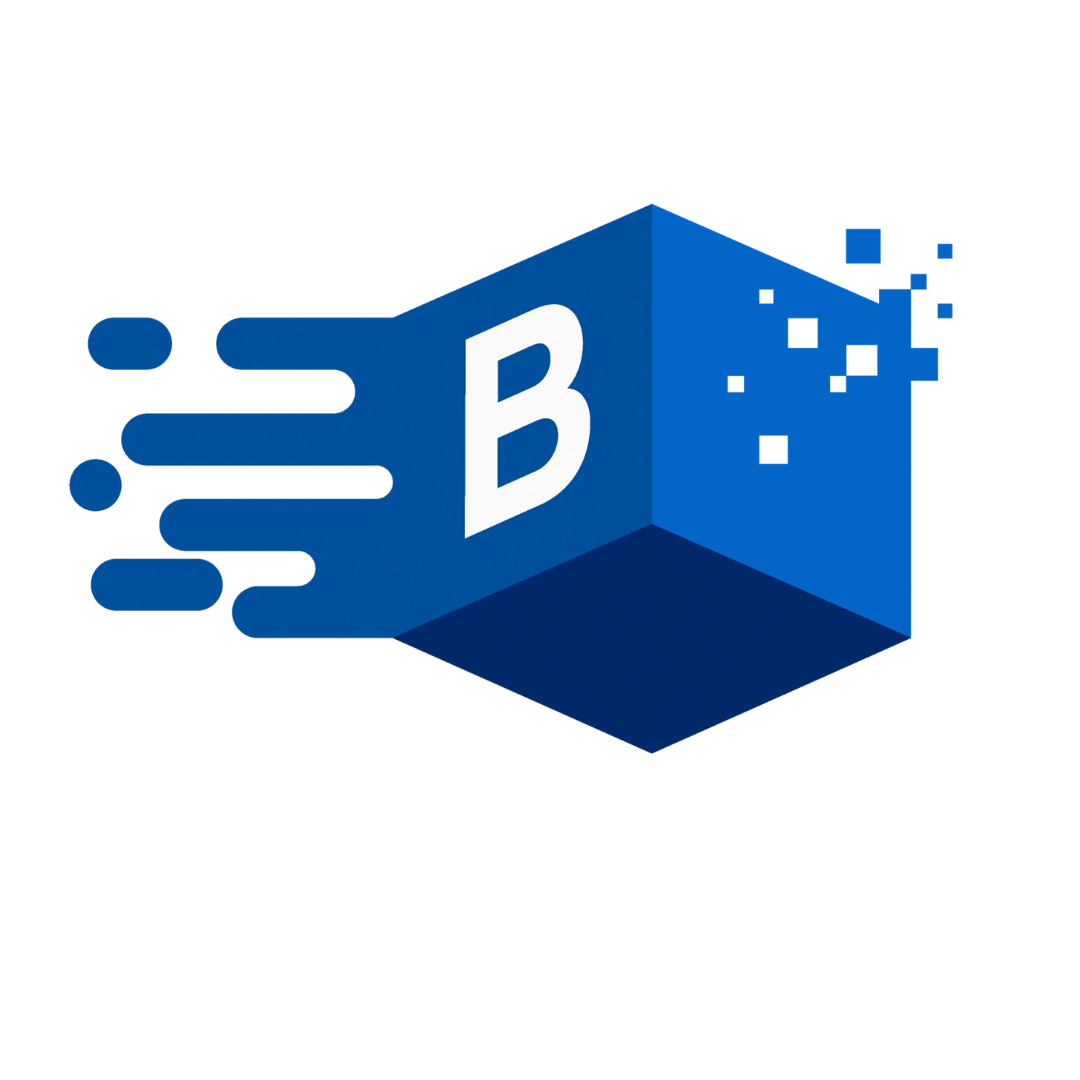 BUKU Marketing
:
May 10, 2023 1:00:00 PM
BUKU Marketing
:
May 10, 2023 1:00:00 PM
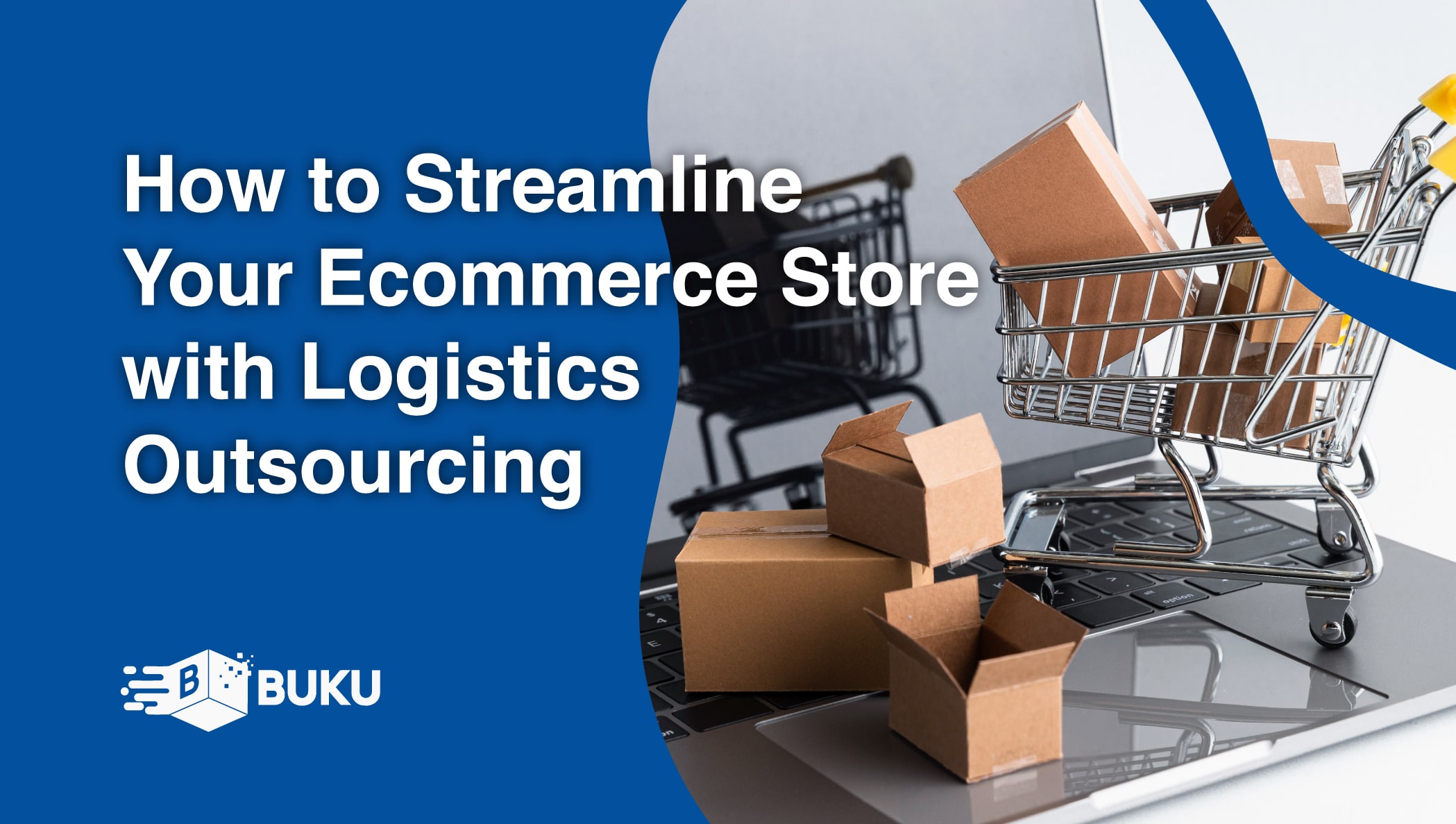
Logistics is a critical component of any retail business and even more important for eCommerce companies. As the popularity of eCommerce has risen, so has the need for faster and more efficient logistics solutions.
Table of Contents
1. What is Logistics Outsourcing?
2. What are the Benefits of Outsourcing to 3PLs?
3. What are the Risks of Outsourcing Logistics to 3PLs?
5. How to Choose the Right 3PL for Your Ecommerce Business
6. How to Negotiate Your Contract with the 3PL Provider
7. How 3PLs Will Manage Your Logistics
8. 3PL Performance Tracking & Monitoring
In the United States alone, eCommerce sales have increased at an average rate of 43% year over year, topping $60 billion in 2020. Pair that with an increasingly demanding consumer, and you’ve got an industry that has seen incredible growth in the past few years – third-party logistics providers.
Outsourcing logistics to third-party providers has become the norm for eCommerce businesses rather than the exception. The global 3PL market size was valued at $1,034.43 billion in 2022 and is expected to continue growing at an annual rate of 10.7% through the end of the decade.
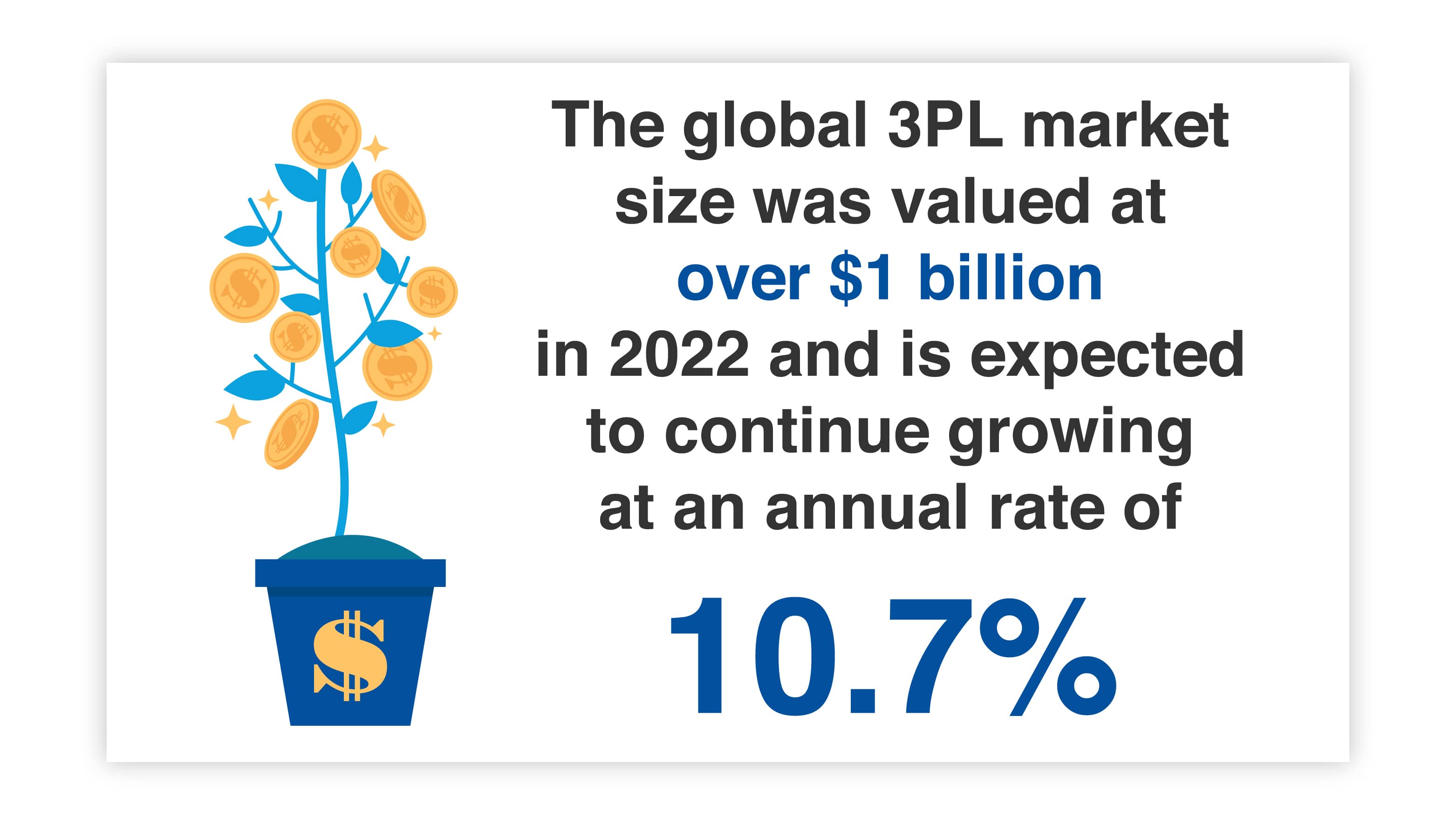
The increasing popularity of online shopping drives a lot of that growth. As the industry expands to include a greater number of businesses and products, companies are looking for a way to maximize their efficiency and find better ways to handle their logistics pipeline.
Another driving factor behind the adoption of 3PLs is the changing supply chain. The Covid-19 pandemic put incredible strain on supply chain operations worldwide.
Lockdowns, shutdowns, supply shortages, and transportation snags left many businesses wondering if they could weather the challenges. 3PLs provide these eCommerce companies the peace of mind and stability in the face of current and future potential catastrophes.
If you’re an eCommerce business struggling to solve your logistics problems, a 3PL might be the game-changer you’re looking for. But outsourcing any service is a big decision with major, long-term implications. And knowing how to choose the right provider, which services to outsource, and how to get started are big questions to answer.
This article will outline the answers to these questions and provide helpful information about how to go about outsourcing your logistics systems to a third-party provider.
Before you decide if logistics outsourcing is right for your business, you must understand exactly what the term means. And even more important, what 3rd party logistics providers do and how eCommerce companies can benefit from using one.
Outsourcing describes when a business uses another business to provide a service. In the case of third-party logistics providers, that service is one or all the tasks involved with logistics and supply chain activities.
For instance, an eCommerce company might hire a 3PL to handle their inventory storage. And then, they might use that 3PL to pick orders from that inventory, package those orders, and arrange and schedule the shipping of those products to either the business itself or directly to the consumer.
3PLs provide a wide range of services for eCommerce companies. Some businesses choose to outsource the entirety of their logistics activities to a 3PL, while others pick and choose from the menu of options available.
Many eCommerce businesses start small. Businesses of this size often choose to handle their logistics in-house, using a small office space or even operating out of a basement or garage. As businesses look to grow and expand, they may need to find solutions that enable them to keep up with increased business.
Maybe they need more warehouse space. Maybe they don’t have the labor to process orders promptly. Or maybe they’re searching for shipping solutions that allow them to get deliveries to customers quickly.
On top of these reasons, 3PLs also give companies access to several other value-added services that help them streamline their operations. Inventory management is a common service offered by 3PLs.
Packaging solutions are often included in the mix. And one of the greatest advantages available in just the last few decades is access to automation and technology that 3PLs use to enhance efficiency.
These are things most eCommerce businesses couldn’t afford to implement on their dime. But outsourcing logistics to a third-party provider means they get all the benefits without the upfront costs.
Partnering with a 3PL gives companies a whole host of benefits, such as:
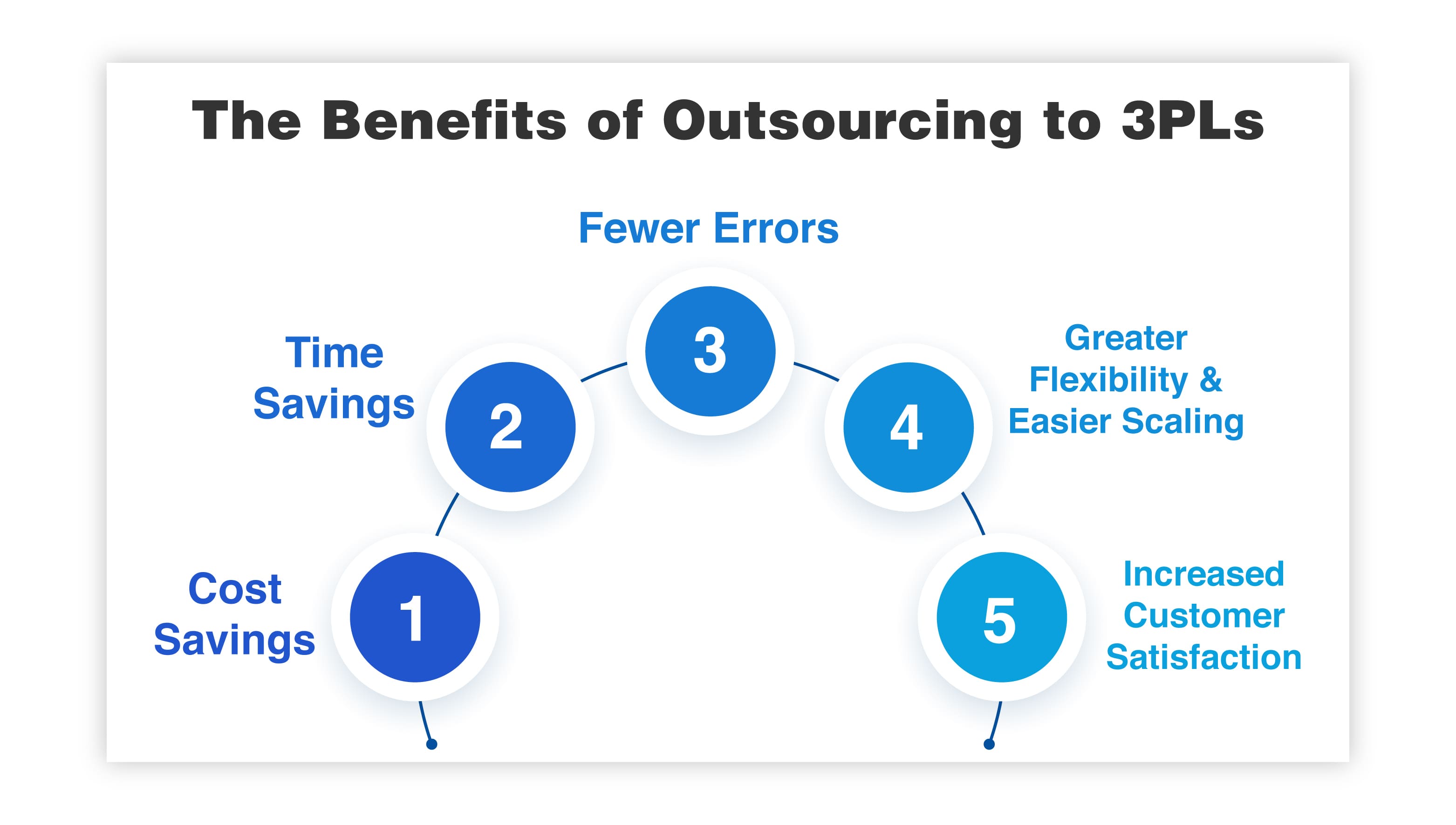
Logistics outsourcing represents an upfront cost for businesses. But because 3PLs offer a menu of consolidated services and can negotiate better rates with shipping carriers, businesses often see a reduction in overhead costs when they utilize a 3PL.
Other cost savings come in the form of a reduced need for labor to handle fulfillment, packaging, shipping, and receiving tasks, and because using a 3PL usually comes with a dedicated warehouse space.
One of the most obvious benefits of partnering with a 3PL comes in the form of time savings. When you add up all the daily tasks that 3PLs manage for businesses, it amounts to a large chunk of time. Handing those tasks over to someone else means business owners get that time back and can spend it on other activities.
Because most 3PLs now rely on a complex system of automation and technology tools to handle the workload, they can avoid costly errors and mistakes that occur when human interactions are a part of the process. Human errors can lead to damaged goods, missing inventory, shipping and receiving errors, and ultimately, dissatisfied customers.
Scaling a business requires putting all the right resources in place to properly manage growth and an increased order volume. More warehouse space is required to hold inventory. An increase in labor is required to keep up with an increase in demand. Greater shipping capabilities are needed to get products to customers. When a 3PL handles your logistics activities, scaling and growth are easier because everything you need is already there.
Every action was taken in business centers around the customer. 3PLs give eCommerce businesses a better opportunity to satisfy customers by offering them all the tools they need to get the job done quickly and efficiently.
They also provide faster shipping because many offer a network of locations across the country, which means businesses can position themselves closer to their customers. This enables faster last-mile delivery and makes it easier and more cost-effective for businesses to offer two-day or same-day delivery.
Any coin has two sides, and logistics outsourcing is the same. While there are many benefits to be had when businesses outsource their logistics activities, their choice does not come without risks or challenges. Here are some of the big risks eCommerce businesses who outsource to 3PLs face.
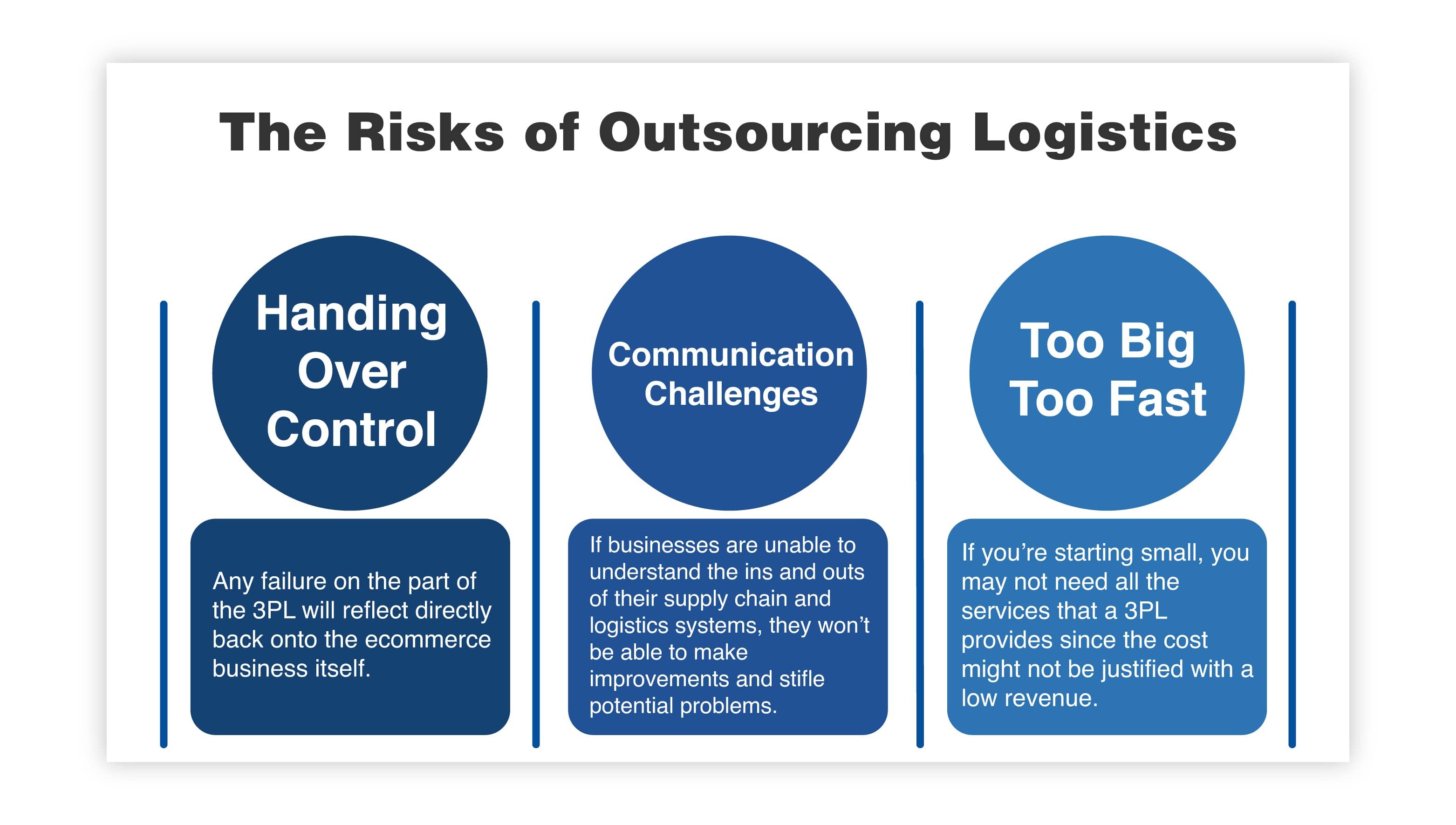
Anytime you give up control of a portion of your operations to someone else, it involves a measure of risk. Logistics activities are key to keeping customers happy and loyal. Any failure of the 3PL will reflect directly back onto the eCommerce business itself. Customers won’t differentiate between you and your 3PL partner. That’s why the choice of 3PL is so important.
A 3PL must offer access and transparency to the businesses they serve. If businesses cannot understand the ins and outs of their supply chain and logistics systems, they won’t be able to make improvements and stifle potential problems.
3PLs offer great options for businesses looking to scale and grow their operations. But if you’re starting small, you may not need all the services that a 3PL provides.
In that scenario, businesses end up losing money because they’re spending too much on the 3PL contract itself without having the sales and revenue to justify the investment. Smaller businesses are not ready to scale might be better off keeping logistics in-house.
Ecommerce businesses that choose to outsource logistics activities have a lot of choices to pick from. 3PLs offer different options for business, from basic to full-service partnerships. Understanding the different types of 3PLs will help when it’s time to choose one for your business.
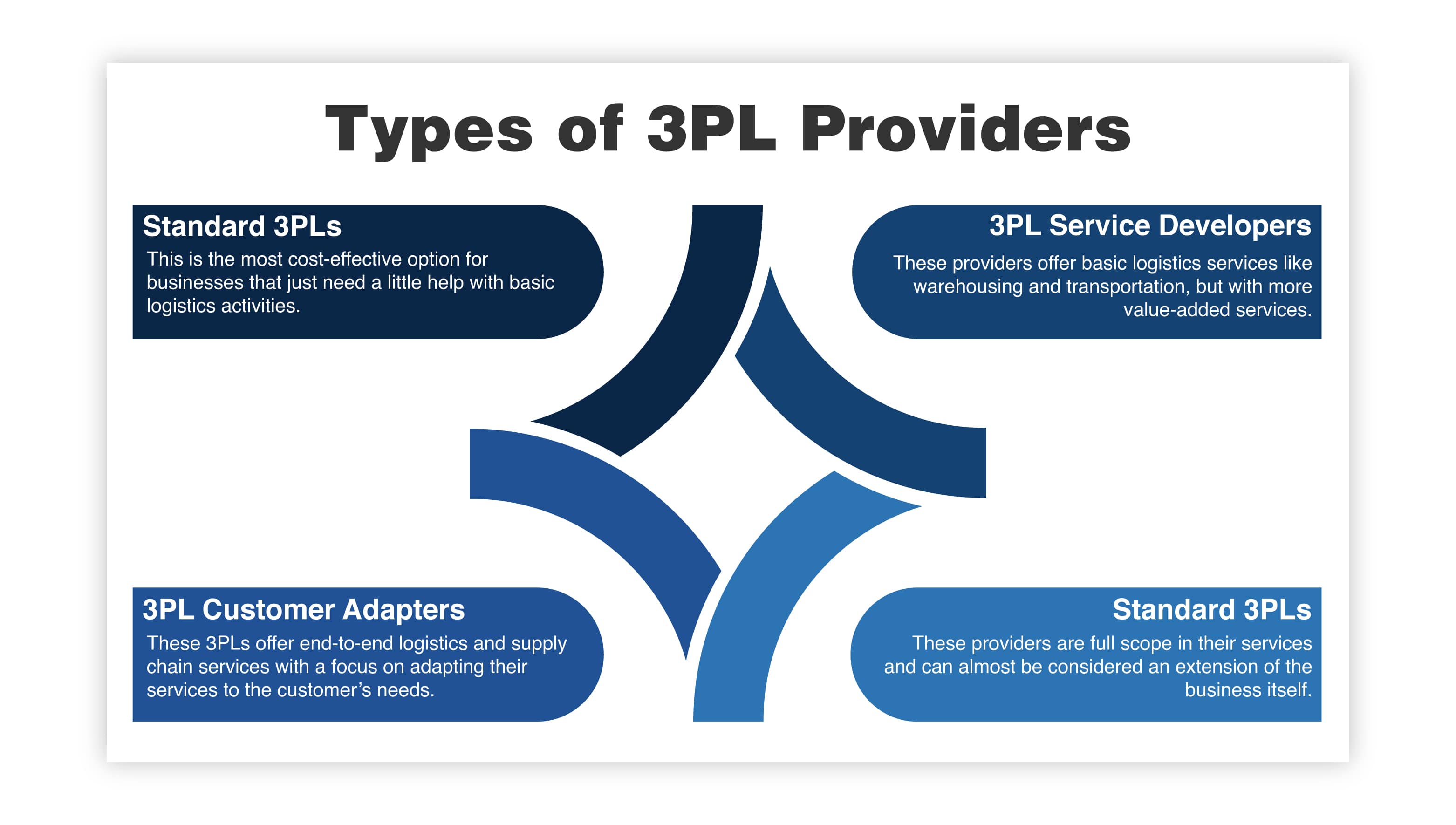
If you’re looking for basic logistics assistance, this type of 3PL is probably the most logical choice. Standard 3PLs typically offer some basic warehousing capabilities.
They can also handle your supply chain's transportation and distribution aspects, but that’s about it. This is the most cost-effective option for businesses that just need some help with basic logistics activities.
For businesses who want greater options to manage their basic logistics activities, 3PL service developers are the way to go. These providers offer basic logistics services like warehousing and transportation but with value-added services thrown in.
Think of technology to support additional shipment tracking, security, compliance, and regulatory management. They may also offer packaging options and even cross-docking options to expedite shipping and delivery.
The options that these providers offer center around the term "adapter." These 3PLs offer end-to-end logistics and supply chain services focusing on adapting their services to the customer’s needs.
3PLs of this size can better negotiate rates with shipping carriers. They offer access to a full range of support technologies to help businesses manage their inventory, fulfillment, shipping, and other needs.
This access to technology gives businesses transparency into their processes and allows them to manage processes themselves or allow the 3PL to take over tasks for them.
The largest and most involved of the 3PL providers are considered “customer developers.” These providers are full scope in their services and can almost be considered an extension of the business itself.
Businesses with the operational budget to hire a 3PL customer developer get a full team to handle every step of the logistics process, allowing a completely hands-off approach for the business owner.
By now, you should realize that outsourcing logistics to a 3PL is a big decision. Handing over the reins of your operations to a third party can be nerve-racking, especially if you’re not sure it’s the right choice. But careful planning and a big-picture view of your business can help clarify the decision.
Here are some things to consider when choosing a 3PL for your business:
What is the scale of your operations right now?
Are you in a good place operation-wise, or struggling with a particular portion of your logistics process? Are you running out of room for inventory storage? Are you struggling to meet demand and keep up with your order fulfillment? Do you need access to faster shipping options and better delivery options?
Outlining your current position and then weighing it against your needs is a great way to pinpoint where the shortfalls are happening. That information will help you choose the right 3PL based on your needs.
Where do you want to be in two years? Five years? Ten years?
Looking ahead is essential in business, especially if the goal is to grow. While your infrastructure and operations might be suitable to support your current size and scope, if you plan to expand over the next few years, having the right support structure in place now will save you risk and headaches.
What do you expect from a 3PL?
The services offered by a third-party logistics provider are only half the equation. Remember that any partner in your business assumes some responsibility for the success of that business, especially when their involvement directly impacts your customers.
Look to choose a 3PL with a solid reputation and positive, long-term relationships with other businesses and shipping carriers.
Read up on customers' past experiences with the 3PL. Ensure that they operate with the characteristics you value and will respect your business as much as you do.
What kind of technology, automation, and integration do they offer?
With the rapid changes happening in the 3PL industry, the use of software and tech tools cannot be overlooked. Choosing the right 3PL should include consideration of whether they’re using the best tools for the job and ensuring the tools they use allow you full access, transparency, and visibility into the process.
Once you’ve selected the right 3PL for outsourcing your logistics operations, it’s time to negotiate that contract.
Many business owners start to sweat when it comes time to sign over some of their operations. But it doesn’t have to be that way. Understanding what your contract with a 3PL should look like and include will help create a smooth and confident process.
Your final contract should be detailed and in-depth and should include the following:
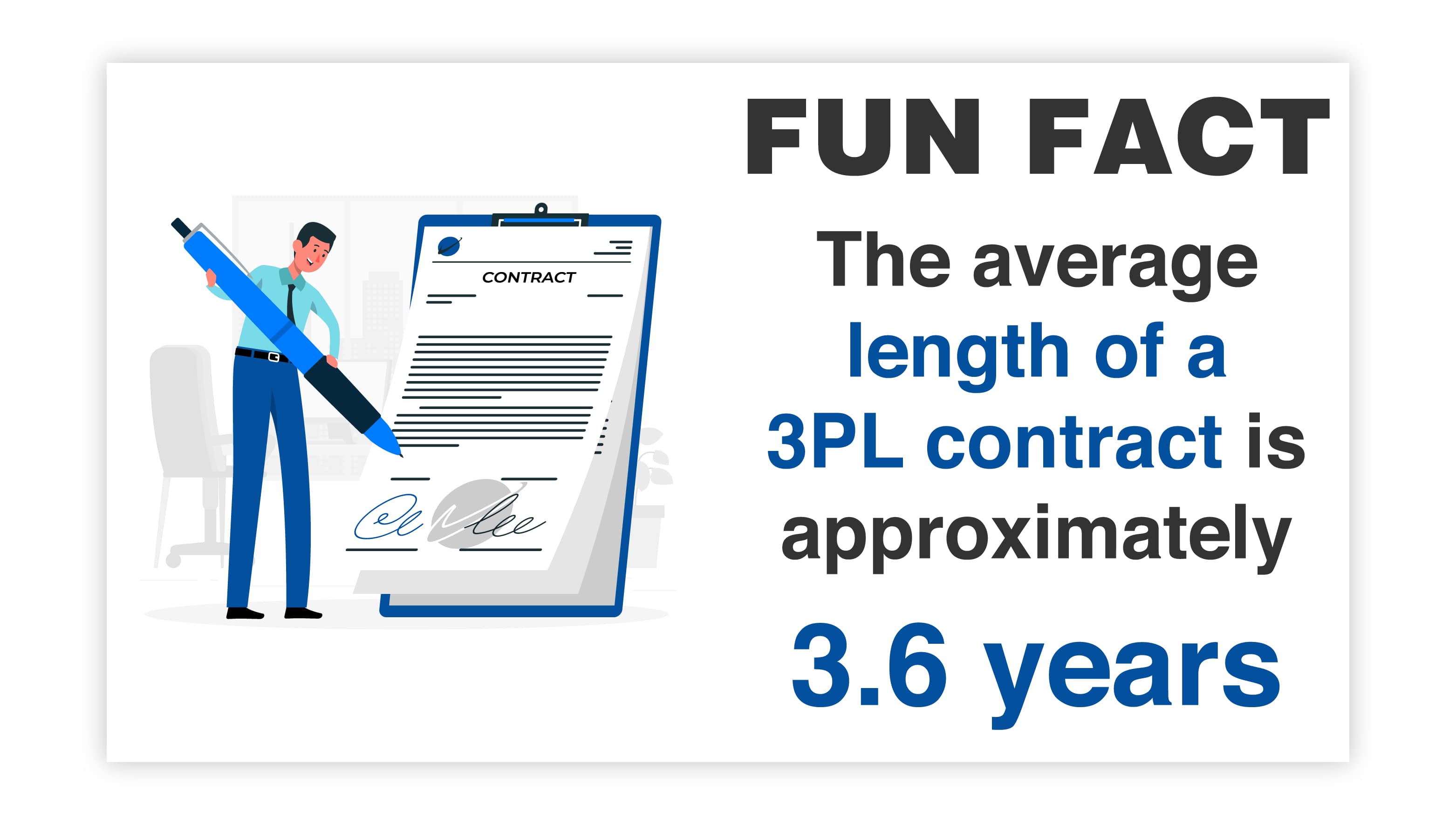
If it’s not in writing, it doesn’t exist – The entire point of a contract is to get everything down on paper as evidence to back your claims. Don’t rely on a handshake or verbal contract regarding anything, ever. Get it on paper and include it as a part of the contract.
Most 3PLs offer a standard master contract to their partners. But remember that you can make addendums to that contract. These addendums allow you to specify what you want and expect regarding customizations and offerings specific to your company.
Pay attention to the length of the contract, especially when it comes to payment. Most 3PLs will offer month-to-month pricing dependent on the business needs and requirements. But to protect your investment and your business, looking several years down the road will be necessary. Use yearly performance reports and projections to help you and the 3PL know what to expect down the line.
To fully protect your business when signing any contract, it will be helpful to seek legal advice. An attorney or law firm specializing in contracts of this type will know what to look for and understand the contract's language. They can help you avoid costly mistakes and oversights that will leave your business vulnerable and liable.
Make sure any contract fully outlines those considerations that will protect your business. This includes warehouse liens, which could allow the 3PL to sell any inventory on-site if a business violates its contract or misses a payment.
Make sure the 3PL includes language regarding their liability in terms of insurance protections of both their buildings and equipment and any inventory you store in their care.
Understanding exactly how logistics outsourcing works will help you gain a clearer picture of exactly what 3PLs can offer your business and why choosing to use one will be beneficial. Let’s discuss exactly how 3PLs will manage your specific logistics activities.
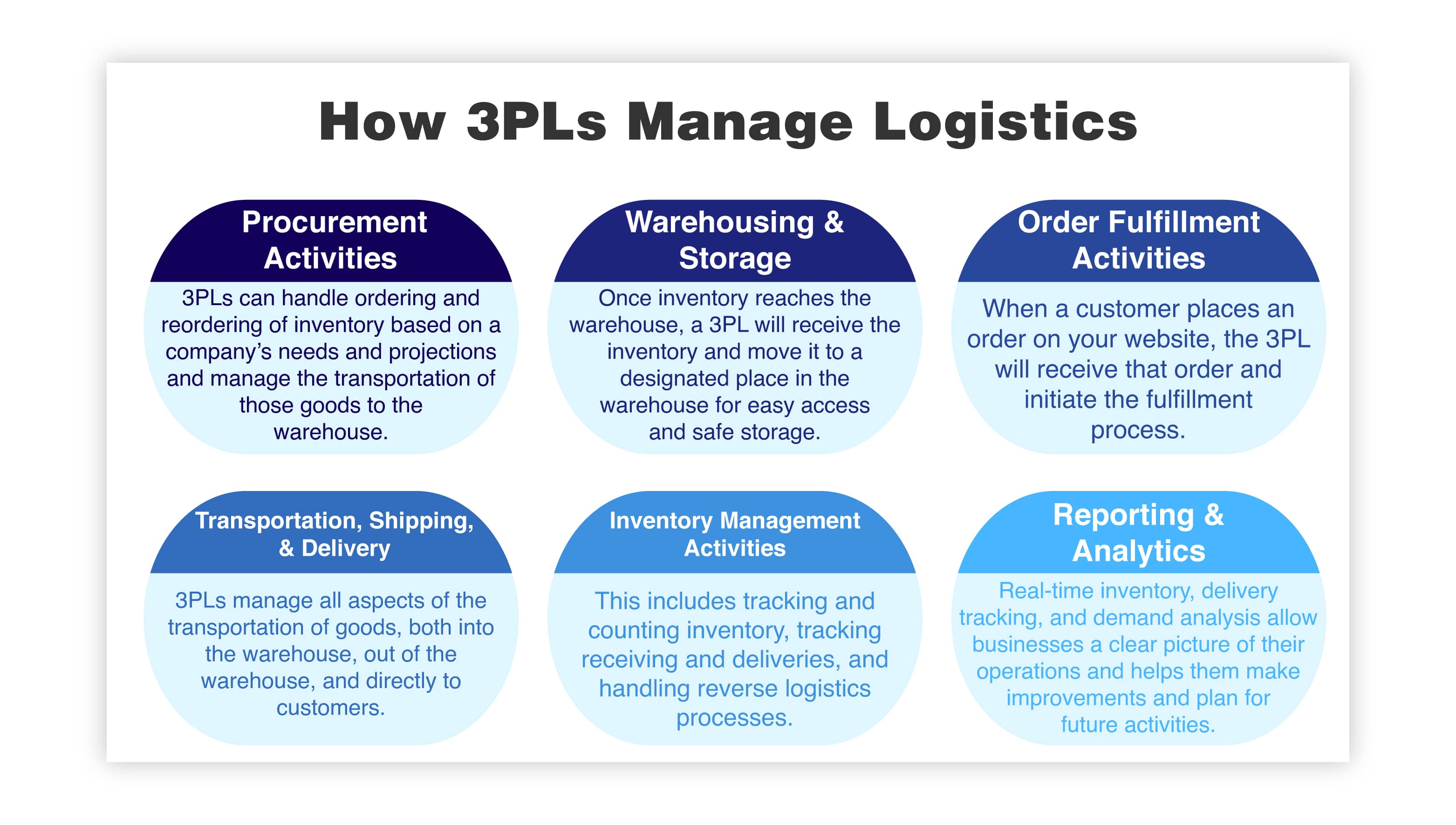
Your supply chain starts at the beginning and includes the vendors or companies which you procure your products from. 3PLs can handle ordering and reordering of inventory based on a company’s needs and projections and manage the transportation of those goods to the warehouse.
Once inventory reaches the warehouse, a 3PL will receive that product by scanning it and adding it to existing inventory for easier tracking. They will then strategically move the inventory to a designated place in the warehouse for easy access and safe storage.
When a customer orders on your website, the 3PL will receive that order and initiate the fulfillment process. This includes having workers or automated tools “pick” the order from existing inventory in the warehouse and prepare that order for shipment by packaging it correctly.
3PLs manage all aspects of the transportation of goods, both into the warehouse, out of the warehouse, and directly to customers. This includes packaging and loading goods and containers, managing details with shipping carriers, and even providing package tracking capabilities.
Because 3PLs house inventory for businesses, they often offer inventory management services. This includes tracking and counting inventory, receiving and deliveries, and handling reverse logistics processes.
The inclusion of advanced technologies has given 3PLs the ability to offer a range of reporting for businesses. Real-time inventory and delivery tracking, in-depth order, and demand analysis, and more allow businesses a clear picture of their operations and helps them make improvements and plan for future activities.
Once you’ve chosen a 3PL, negotiated and signed that contract, and are ready to get work – the job is not done. Oversight and monitoring are vital for the continued success of any logistics outsourcing contract.
You wouldn’t hand over control of your sales or marketing activities without checking in and asking for progress reports, right? The same holds for partnering with a 3PL provider. Ongoing involvement from both parties is essential.
SLAs are sort of like promises from the 3PL to your business. When a 3PL agrees to take over a particular logistics activity, you should expect them to perform to a specific standard. Establishing those standards beforehand will ensure that there are no misunderstandings or miscommunications.
Ecommerce businesses that partner with a 3PL should ask for a designated point of contact and understand clearly who that contact is and how to reach them at any time.
This eliminates the need for lengthy phone calls and email chains as the 3PL moves you up the command ladder. And it gives you a clear representative responsible for communicating with you and solving problems on your behalf.
Part of contract negotiations should include specifics about what kinds of data and reports the 3PL will provide you with. That means what the reports will include, how often you will receive them, and how to access them.
Deciding on specific key performance indicators (KPIs) beforehand will help you track the performance of both your business and the 3PL provider itself. Since the 3PLs activities directly impact your business, tracking these KPIs will help identify areas where service isn’t meeting expectations.
![]()
Some KPIs to consider are:
In essence, you’re hiring a 3PL provider as an extension or employee of your business. They perform tasks on your behalf, and like any employee, they should be subject to periodic performance reviews.
Establish an expectation for these reviews so the 3PL understands that you will hold them to a high standard and ask for proof that they’re holding up their end of the bargain.
The future of retail is online. Even brick-and-mortar stores are using online sales structures in conjunction with physical sales to bolster their revenue and keep customers happy.
This means even greater competition amongst eCommerce stores, which already face heavy competition between each other. Mega companies like Amazon make the eCommerce environment even more cutthroat and challenging for the smaller guy.
Using a 3PL to outsource logistics activities is one critical way that eCommerce businesses can stay competitive. Customers have gotten used to super-fast and efficient delivery options at a meager cost (sometimes even free).
Some call this the “Amazon Effect,” which has real implications for eCommerce businesses trying to keep up. If you can’t offer your customers fast, efficient, and cheap delivery options, you will find yourself struggling to succeed.
The future of the third-party logistics industry is an automated one. 3PLs are increasingly incorporating advanced technologies, smart digital tools and software, and automation and robotics to compete. These tools also allow 3PLs to offer better, faster, and more effective services to their eCommerce partners.
Progress usually relies on innovation. And innovation is bolstered by progress. They work in conjunction with each other. Ecommerce businesses that want to remain successful and grow their operations need to find new and better solutions to keep up with both.
3PLs are one of the best ways to do so, offering high-tech tools and solutions, fast and efficient logistics outsourcing, and a greater percentage of satisfied customers at the end of the day.
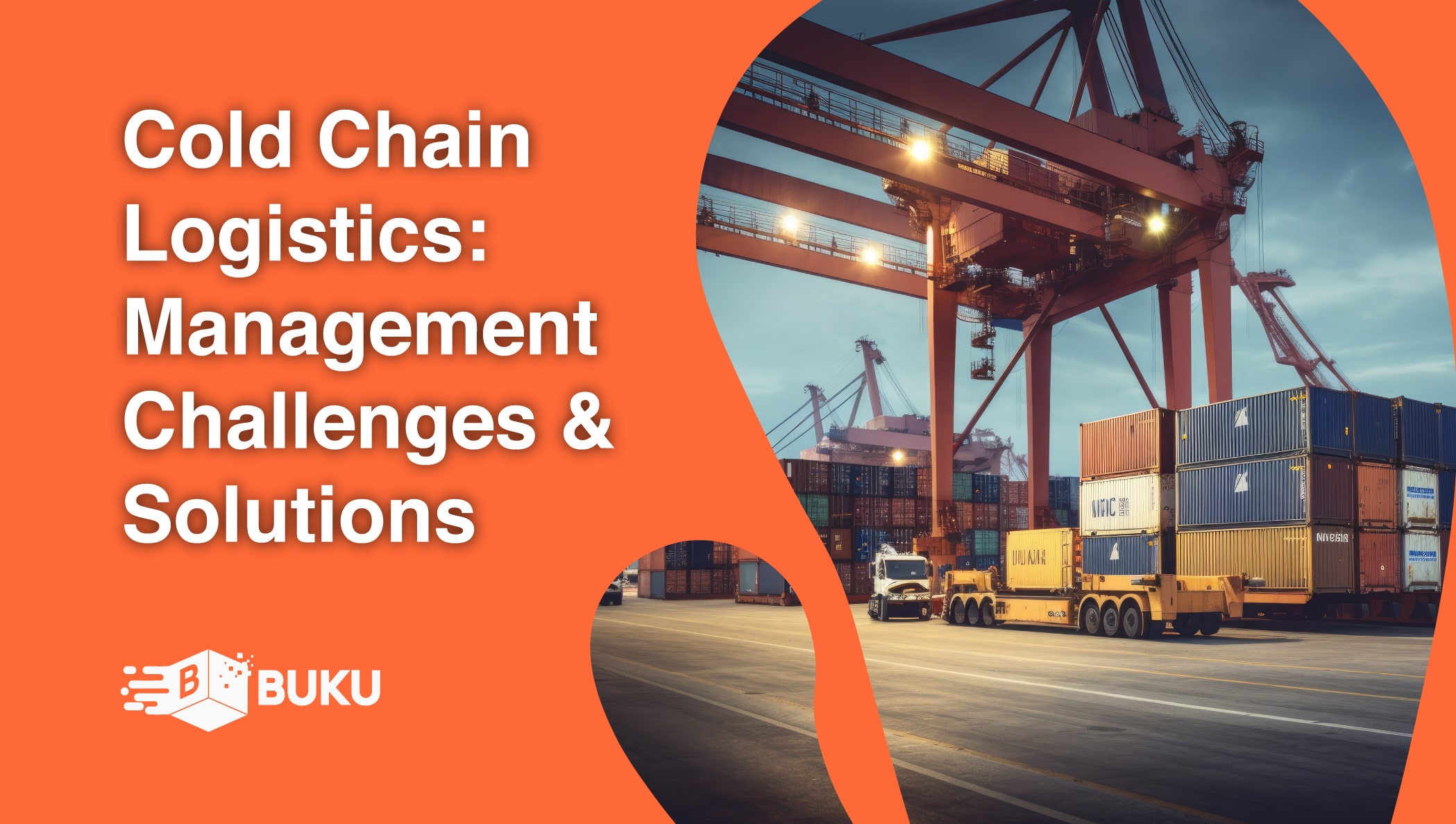
The supply chain is a term used to describe all the components required to transport goods from beginning to end, from production to the end...
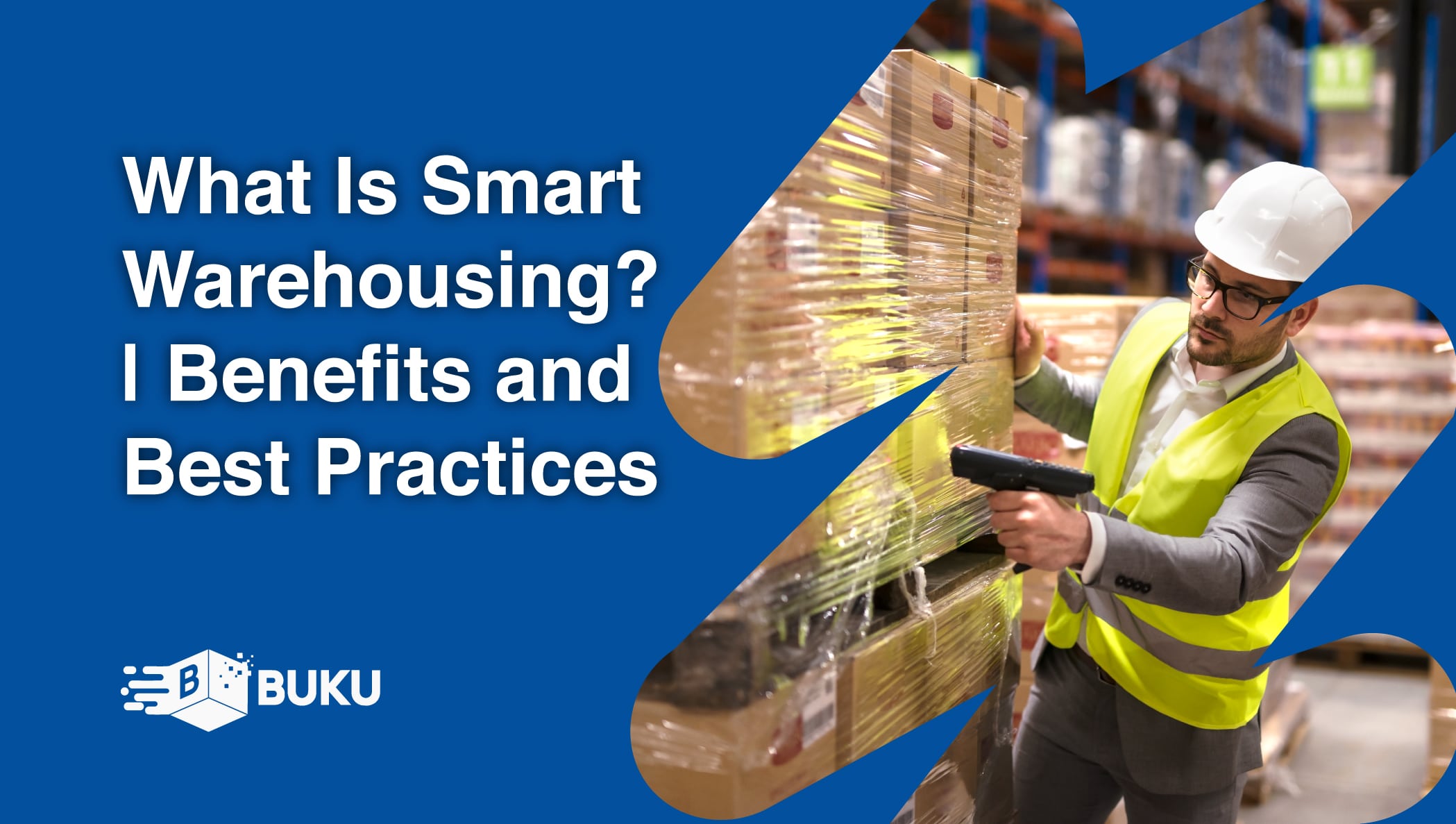
A smart warehouse is a large building where raw materials and other consumer goods are stored using machines, computers, comprehensive software, and...
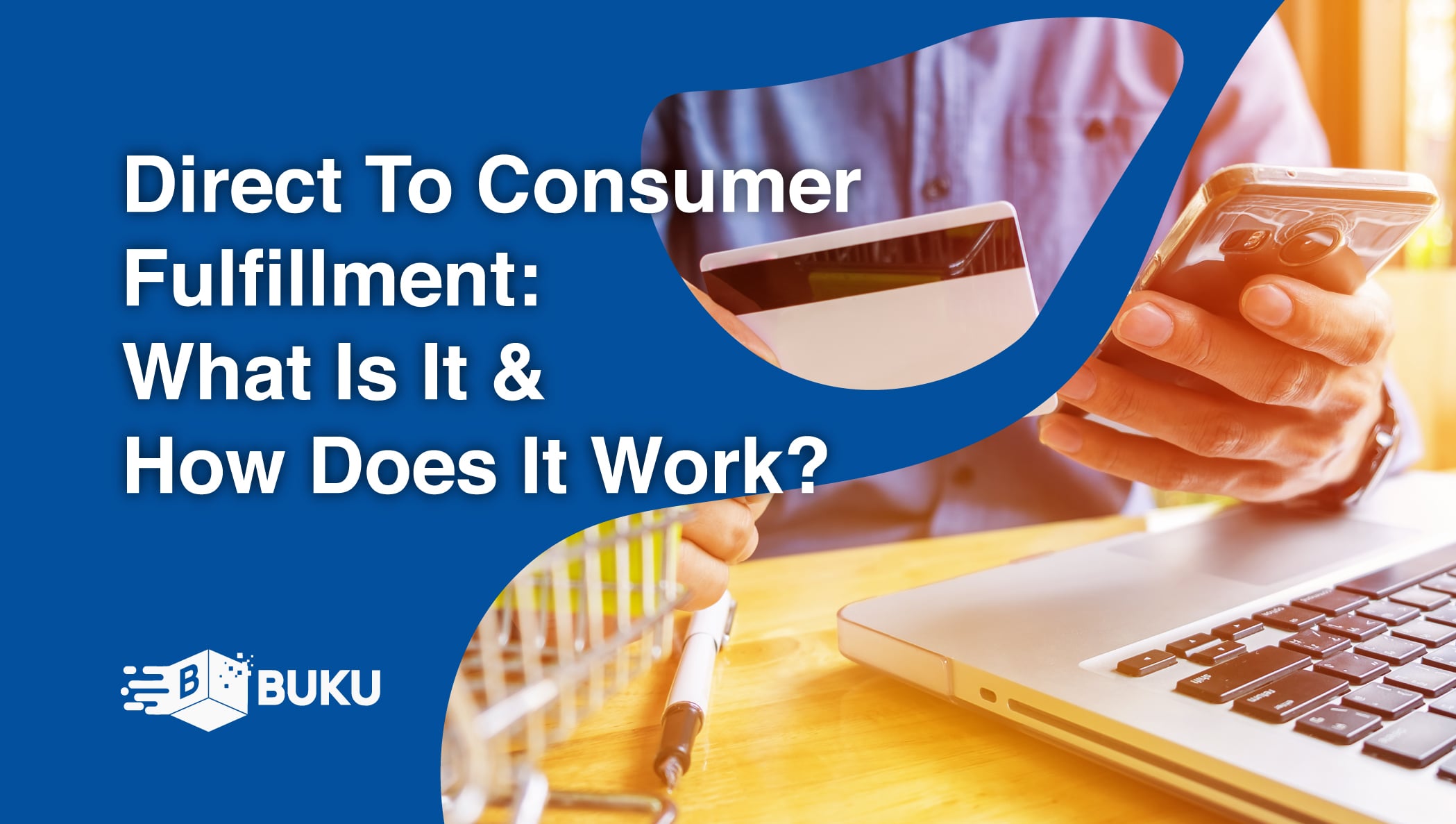
Direct-to-consumer (DTC) fulfillment is a strategy that helps brands sell and deliver their products directly to customers more efficiently while...